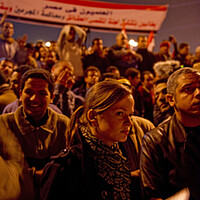With Egypt's Morsi ousted and Islamists arrested, what next?
Loading...
| Cairo
In Egypt, top Muslim Brotherhood leaders have been arrested and Islamist television channels raided hours after Egypt's military ousted elected Islamist president Mohamed Morsi.
The head of Egypt's armed forces, Abdel Fattah El Sisi, announced on state television this evening that Egypt's constitution was suspended, a new civilian government would be installed, and early elections would be held. Mr. Morsi had “failed to meet the demands of the people,” said Gen. Sisi. Surrounded by religious and political leaders who agreed to the military's plan for transition, Sisi said the head of Egypt's Supreme Constitutional Court will act as head of state, and a technocratic government will rule until new presidential and parliamentary elections are held.
The military's ouster of Egypt's first freely elected president came after millions of Egyptians protested around the country and demanded Morsi's resignation. After the military's announcement, masses of people took to the streets of Cairo to celebrate wildly, paralyzing traffic as they waved flags, beat drums, and even danced in the street.
Despite the widespread support for the military's removal of Morsi, the arrests and closures of Islamist television stations send a worrying signal about the military's plans for the previously banned and repressed Muslim Brotherhood, and for the state of human rights in the coming period.
A spokesman for the Muslim Brotherhood said Saad el Katatni, the leader of the Brotherhood's Freedom and Justice Party, and Rashad Bayoumi, a deputy head of the Brotherhood, were detained tonight, and that Brotherhood leaders had been place on a list banning them from leaving Egypt. The president is under house arrest, he said.
Hours after the military's announcement, security forces raided the offices of Al Jazeera's Egyptian television channel, which is seen by many Egyptians as pro-Brotherhood. The security forces detained staff from the channel and also detained staff at Islamist television channels.
The military's move sends Egypt back to the beginning of a transition period, erasing the elections that were held and the Constitution that was written in the past two and a half years since a mass uprising toppled former President Hosni Mubarak. It comes just one year after Morsi took office as Egypt's first freely elected president. After his election by a razor thin margin he alienated many Egyptians when he sidelined the opposition and issued a decree immunizing himself from judicial challenge, using that power to bring a quickly-written and controversial constitution to a vote and to appoint a controversial new prosecutor general.
Many Egyptians who came out to protest decried what they said was his authoritarian behavior, and they complained that he seemed to be more concerned with the Brotherhood than with the nation. Many Egyptians were also frustrated that he had failed to solve the many crises he inherited, like rising prices, gas shortages, and electricity cuts.
But Morsi's supporters call the military intervention a coup that has derailed Egypt's democratic transition. In a statement on Morsi's official Facebook page, he rejected what he called a military coup.
Yet many Egyptians joyously celebrated the announcement. Huge crowds gathered in Tahrir Square and around the presidential palace broke into jubilant cheers when they heard the news, and fireworks flashed above the capital's skies for hours. Parents brought their children into the street to witness a historic day. The streets of the capital, which were largely deserted the past few days outside the major protest areas, turned into scenes of raucous parties.
But at the mosque where Morsi's supporters were gathered since Friday, the crowd broke into angry chants against military rule when they heard the military's announcement. The normally loud protest fell to almost complete silence as groups huddled tightly around radios to hear the announcement. As soon as they heard that Morsi was no longer president, they broke into angry chants of “down with military rule!”
Shortly after, the crack of gunfire sounded nearby and protesters dove to the ground in panic. As he crouched behind a car for cover, Morsi supporter Mohamed Amin said he would not give up his fight for Morsi's right to office. "We will return Morsi by force. We will not allow the military to return," he yelled as gunshots echoed in the square.





